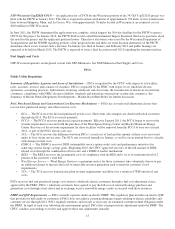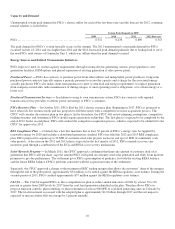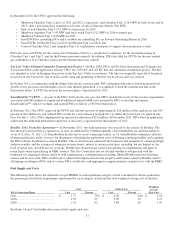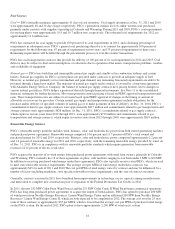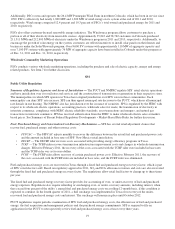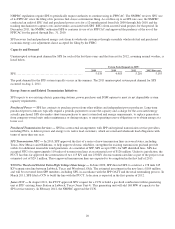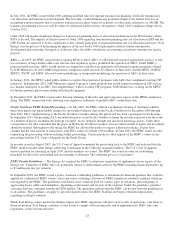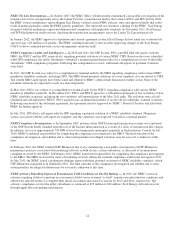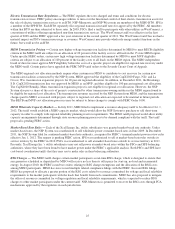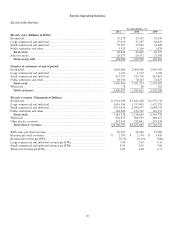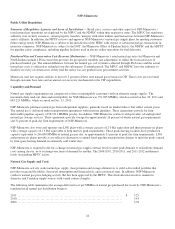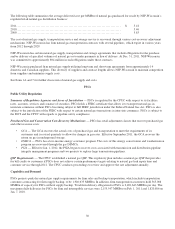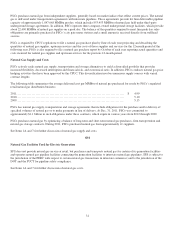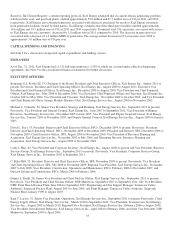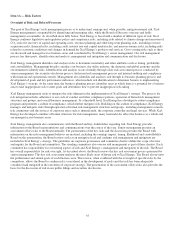Xcel Energy 2011 Annual Report Download - page 35
Download and view the complete annual report
Please find page 35 of the 2011 Xcel Energy annual report below. You can navigate through the pages in the report by either clicking on the pages listed below, or by using the keyword search tool below to find specific information within the annual report.25
Electric Transmission Rate Regulation — The FERC regulates the rates charged and terms and conditions for electric
transmission services. FERC policy encourages utilities to turn over the functional control of their electric transmission assets for
the sale of electric transmission services to an RTO. NSP-Minnesota and NSP-Wisconsin are members of the MISO RTO. SPS is
a member of the SPP RTO. Each RTO separately files regional transmission tariff rates for approval by the FERC. All members
within that RTO are then subjected to those rates. In 2009, PSCo filed a tariff to participate with other utilities in WestConnect, a
consortium of utilities offering regionalized non-firm transmission services. The WestConnect tariff was effective in the first
quarter of 2009 and the FERC approved a two year extension in the second quarter of 2011. The WestConnect tariff has not had a
material impact on PSCo transmission usage or revenues. WestConnect may provide wholesale energy market functions in the
future, but would not be an RTO.
MISO Transmission Pricing — Certain new higher voltage transmission facilities determined by MISO to meet RECB eligibility
criteria in the MISO tariff are subject to an allocation of 20 percent of the facility costs to all loads in the 15 state MISO region.
Under specific FERC orders, certain new high voltage transmission facilities determined by MISO to meet MVP eligibility
criteria are subject to an allocation of 100 percent of the facility costs to all loads on the MISO region. The MISO independent
board of directors must approve MVP eligibility before the costs of a specific project are eligible for regional rate recovery under
the MISO tariff. Certain parties have appealed the FERC MVP tariff orders to the Seventh Circuit Court of Appeals.
The MISO regional cost allocation methods require other customers in MISO to contribute to cost recovery for certain new
transmission facilities constructed by the NSP System. MISO approved the eligibility of the CapX2020 Fargo, N.D. and La
Crosse, Wis. transmission expansion projects for 20 percent regional allocation. In addition, in December 2011, the Brookings,
S.D. CapX2020 transmission line was approved by MISO as an MVP, and thus eligible for 100 percent regional cost allocation.
The CapX2020 Bemidji, Minn. transmission expansion project is not eligible for regional cost allocation. However, the NSP
System also pays a share of the costs of projects constructed by other transmission-owning entities in the MISO region found to
be eligible for regional cost allocation. The transmission revenues received by the NSP System from MISO, and the transmission
charges paid to MISO, associated with projects subject to regional cost allocation are expected to be material in future periods.
The RECB and MVP cost allocation processes may be subject to future change to comply with FERC Order 1000.
MISO Wholesale Capacity Markets — In July 2011, MISO filed to implement a resource adequacy tariff to be effective Oct. 1,
2012. The tariff would establish a MISO capacity market, which would allow the NSP System to purchase or sell short-term
capacity in order to comply with regional reliability planning reserve requirements. The MISO tariff proposal would allow utility
capacity arrangements determined through state resource planning processes to be deemed compliant with the tariff. The tariff
proposal is pending FERC action.
Market-Based Rate Rules — Each of the Xcel Energy Inc. utility subsidiaries was granted market-based rate authority. Under
market-based rates, the NSP System was reauthorized to sell wholesale power at market-based rates in June 2009. In December
2011, the NSP System filed for continued market-based rate authority, as required by FERC’s triennial market power review rules
effective Jan. 1, 2012. The request is pending FERC action. SPS was reauthorized to sell at market-based rate rules outside its
service territory by the FERC in 2010. PSCo was reauthorized to sell at market-based rates outside its service territory in 2011.
Presently, Xcel Energy Inc.’s utility subsidiaries may not sell power at market-based rates within the PSCo and SPS balancing
authorities, where they have been found to have market power under the FERC’s applicable analysis. Both PSCo and SPS have
cost-based coordination tariffs that they may use to make sales in their balancing authorities.
RSG Charges — The MISO tariff charges certain market participants a real-time RSG charge, which is designed to ensure that
any generator scheduled or dispatched by MISO will receive no less than its offer price for start-up, no-load and incremental
energy. In August 2010, the FERC issued two orders relating to RSG charge exemptions and the allocation of the RSG costs
among MISO participants. MISO has since issued multiple related compliance filings with the FERC. In recent RSG filings,
MISO has proposed to allocate a greater portion of the RSG costs related to resources committed for voltage and local reliability
requirements to the market participants with the loads that benefit from such commitments. MISO has also proposed to mitigate
the offers of resources committed for voltage regulation and local reliability requirements, which is expected to reduce RSG
charges to other market participants under the current tariff. NSP-Minnesota is permitted to recover the RSG costs through FCA
mechanisms approved by the regulators in each jurisdiction.


